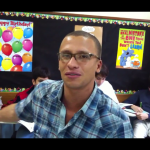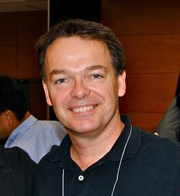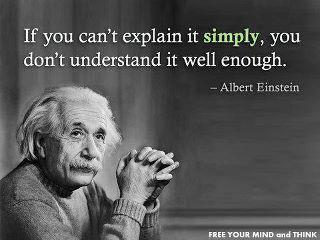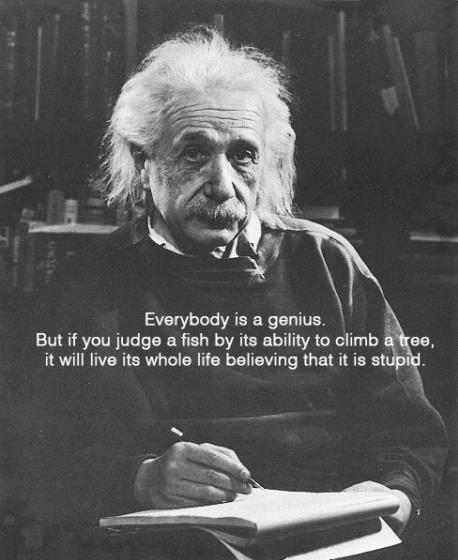 Josette LeBlanc – Korea
Josette LeBlanc – Korea
Josette LeBlanc is an English language teacher and teacher trainer who currently lives and teaches in Daegu, South Korea. She’s passionate about reflective practice, compassionate communication, and the development of online and offline teaching communities. She believes learning should be at the center of the classroom, and therefore aims at creating atmospheres that allow students and teachers to realize this. Josette is also a reflective blogger (www.tokenteach.wordpress.com ), a keen life observer (dabbles in photography and video making), and a collector of cute notebooks from around the world.
What are you passionate about, Josette?
I’m passionate about helping people discover new things about themselves and their teaching. I think this is why I love reflective practice so much. I believe that reflection is about deepening your awareness of teaching and learning. I’ve been using my blog to help me get a better understanding of my teaching and the results have been rich and rewarding. I want to help teachers feel this way too.
This brings me to another passion: building learning/teaching communities. In May, we started a reflective practice special interest group (RPsig) in Daegu, which you may call a branch of the RPsig that was created over a year ago by Michael Griffin, Manpal Sahota and Kevin Giddens (learn more here Our Reflective Community).
Although we’ve only had two meetings so far, the results of the exploration and support have been inspiring. Because reflection is about self-exploration, members are able to examine their own classroom situation, gather ideas on what to change, and come back and talk about it during the next meeting. I believe that this cycle is a great tool for self and professional development.
Another exciting community I’ve been involved in is the online Twitter group KELTchat (check out our blog #KELTChat). We came together by chance, but also by our common connection: English teachers in Korea. Twice a month, we meet on Twitter for an hour to discuss topics relevant to our context. The connections I’ve made via this forum — and Twitter in general – have been mind blowing. I’ve learned about a lot about teaching, but more importantly, I’ve learned how many incredible teachers there are in my own backyard! Without Twitter and KELTchat, I’m not sure I could have known this.
How and why did you become a teacher?
I became a teacher by accident. Really, I guess you could say life pushed me to become a teacher. After graduating I tried to find work that corresponded to my majors, criminology and sociology, but had a hard time. The jobs I did find (part-time night supervisor in a halfway house and legal assistant) weren’t satisfying. I realized what I really craved was work that was creative and made me feel like I was making a difference. Making sure people met curfew and typing out legal documents just wasn’t cutting it. But strangely the idea of becoming a teacher never crossed my mind.
Then one day my cousin who was a teacher was complaining about the work, and all I could think about was how exciting it sounded. The light bulb went off and I started taking steps to become a teacher. They may have been unconventional steps, but they got me where I am today: I started substitute teaching in my hometown; came to Korea in 2005 and completely fell in love with teaching; got my MA TESOL at The School For International Training (SIT) in 2010; and now the journey continues. Teaching is what I was meant to do. It’s incredibly creative, and I feel like I’m making a difference.
Teaching is rewarding work. What keeps me going through the hard times is when I catch that look in a student’s eye that says, “I got it now!” It’s the look that indicates a shift from not knowing to knowing. I teach because I love learning. Learning is what makes the impossible possible. I love the idea of helping people realize this about themselves. And one of the best things about teaching is that my own learning never stops.
What are you most interested in right now?
I’m really interested in the topic of teacher support. I want to help teachers learn how to support each other, and also learn how to personally support themselves. As an in-service teacher trainer in Korea, I meet many Korean teachers of English who feel alone and unsupported in their work. I’ve come to believe that this feeling inhibits them from being able to really be there for their students. On countless occasions teachers have shared with me how exhausted, overwhelmed and depressed they feel about their work conditions. They talk about how they want to consider their students’ learning needs, but they just don’t have the energy to do so.
With my own personal work in learning communities, I’ve learned that teachers can gather some of that much needed energy when they feel empathy. I especially learned this from my Nonviolent Communication (NVC) practice group. I have been a facilitator in this group for about three years. NVC is communication technique that helps us listen to and express feelings and needs with greater empathy. I think that this technique can not only help teachers understand their students’ needs, but that it can also help them get a better understanding of their own needs. One crucial element of NVC is the concept of self-empathy. Without recognizing our own needs, we can’t take care of the needs of others. I would like to help teachers learn how to recognize the value of their own needs.
Another interest of mine is helping teachers learn how to use this tool in class when they communicate with their students. I see NVC as a way of helping teachers become aware of how their language and behavior affects their students’ learning.
What things do you do to help you get better at being a teacher, Josette?
As you’ve read above, my teaching communities are very important to my professional development. I have already mentioned the RPsig, KELTchat, and NVC, but I would also like to mention KOTESOL. KOTESOL was the first teacher’s association I was involved in. It is through this group that I first learned about teacher development, and it is also where I first turned to for inspiration as a new teacher. I’ve been an organizing member of the Daegu KOTESOL chapter for about four years, and a member since I came to Korea.
What advice would you give to a teacher just starting out on a journey of professional development?
When you first start your journey in professional development, you’ll probably want a lot of tips and advice on how to teach. Find a group who doesn’t mind giving this to you, but also make sure this group puts more importance on helping you find your own answers. The best tips come from experience, and even if your experience is limited, it is invaluable. True mentors will help you see this and guide you along the way by asking the questions you need to hear.
Is there any blog or online link you’d like to recommend?
This is such a hard question because there are so many great blogs that I can’t give you just one. I’ll tell you about some of my favorites if you don’t mind.
Alien Teachers by Alex Walsh: Alex writes honest and profound reflections about his experience as a high school teacher in Korea. He also offers creative lesson plans and teaching ideas.
Elt-resourceful by Rachael Roberts: Rachael’s teaching tips are incredibly insightful and ready-to-use. What I also like about her blog is the personal touch she adds to her tips. When I read her blog I feel like we’re talking about teaching over a cup of coffee.
The Other Things Matter by Kevin Stein: Kevin’s talent at writing fictional stories for English language learners has moved me on countless occasions. His blog showcases his creativity and also his ability to look at his teaching in a fresh and courageous manner.
ELT Rants, Reviews, and Reflections by Michael Griffin: Mike’s ability to question what most people accept about teaching at face value never ceases to amaze me. His reflections and rants display an honest curiosity that leaves readers wondering and unsure: a place I think every teacher needs to stand on.
The Daily Ptefldactyl by Laura Phelps: Laura writes about her experience as an ESL/EFL teacher, trainer and now coursebook writer. Her blog is speckled with intriguing questions about teaching and learning, and inspiring examinations of what life as an ELTer is like.
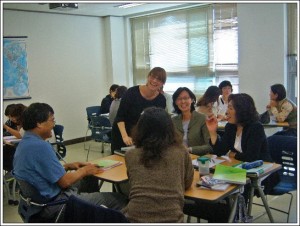 What’s your favorite quotation about being a teacher?
What’s your favorite quotation about being a teacher?
A constant in my life:
Tell me and I’ll forget; show me and I may remember; involve me and I’ll understand. – Chinese proverb
Without experience, and our reflection on this experience, I believe learning is stunted. It is through experience that we grow and expand.

 Kevin Stein is the coordinator of the International Course at Clark Memorial International High School Osaka Campus. He believes that a classroom is a place for teachers and students to learn and grow together. He lives in Nara, the ancient capital of Japan, and often spends Saturdays feeding deer with his daughter. When he is not feeding deer, he can often be seen making up silly songs and dances with the other members of his family.
Kevin Stein is the coordinator of the International Course at Clark Memorial International High School Osaka Campus. He believes that a classroom is a place for teachers and students to learn and grow together. He lives in Nara, the ancient capital of Japan, and often spends Saturdays feeding deer with his daughter. When he is not feeding deer, he can often be seen making up silly songs and dances with the other members of his family.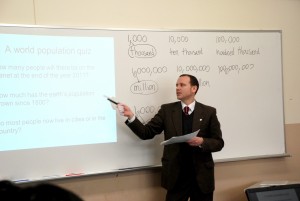 It is our job to help students realize how much they already know about language. — John Fanselow
It is our job to help students realize how much they already know about language. — John Fanselow
